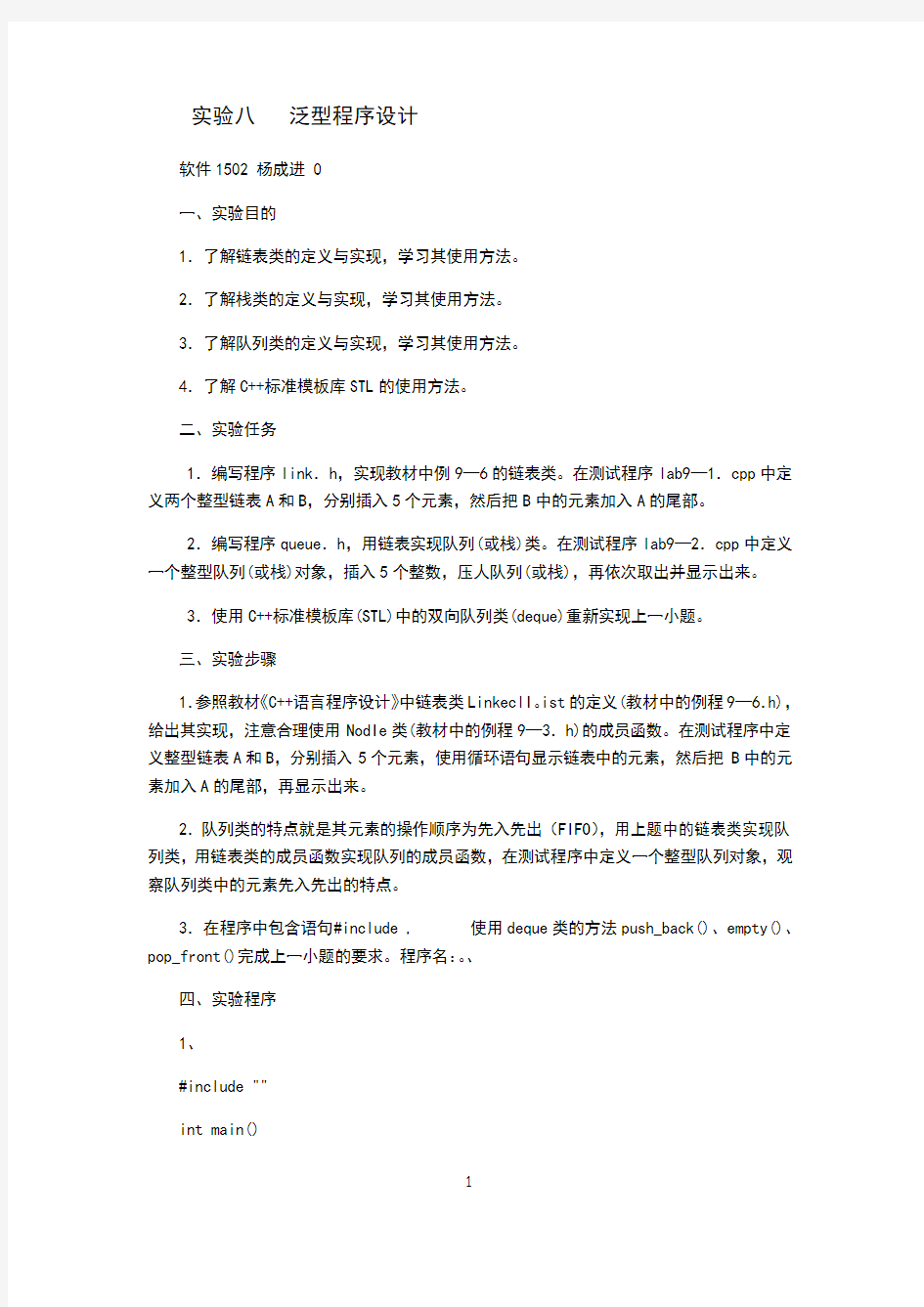实验八泛型程序设计


实验八泛型程序设计
软件1502 杨成进 0
一、实验目的
1.了解链表类的定义与实现,学习其使用方法。
2.了解栈类的定义与实现,学习其使用方法。
3.了解队列类的定义与实现,学习其使用方法。
4.了解C++标准模板库STL的使用方法。
二、实验任务
1.编写程序link.h,实现教材中例9—6的链表类。在测试程序lab9—1.cpp中定义两个整型链表A和B,分别插入5个元素,然后把B中的元素加入A的尾部。
2.编写程序queue.h,用链表实现队列(或栈)类。在测试程序lab9—2.cpp中定义一个整型队列(或栈)对象,插入5个整数,压人队列(或栈),再依次取出并显示出来。
3.使用C++标准模板库(STL)中的双向队列类(deque)重新实现上一小题。
三、实验步骤
1.参照教材《C++语言程序设计》中链表类LinkeclI。ist的定义(教材中的例程9—6.h),给出其实现,注意合理使用NodIe类(教材中的例程9—3.h)的成员函数。在测试程序中定义整型链表A和B,分别插入5个元素,使用循环语句显示链表中的元素,然后把B中的元素加入A的尾部,再显示出来。
2.队列类的特点就是其元素的操作顺序为先入先出(FIFO),用上题中的链表类实现队列类,用链表类的成员函数实现队列的成员函数,在测试程序中定义一个整型队列对象,观察队列类中的元素先入先出的特点。
3.在程序中包含语句#include
四、实验程序
1、
#include ""
int main()
{
L inkedList
f or(int i=0;i<5;i++)
{
(2*i+1);
(2*i+2);
}
();
c out << "链表A的元素为:" ;
w hile(!())
{
cout << () << " ";
();
}
c out << endl;
();
c out << "链表B的元素为:" ;
w hile(!())
{
cout << () << " ";
();
}
c out << endl;
c out << "把B中的元素插入A中..." << endl; ();
{
());
();
}
();
c out << "此时,链表A的元素为:" ;
w hile(!())
{
cout << () << " ";
();
}
c out << endl;
}
#ifndef LINKEDLIST_CLASS
#define LINKEDLIST_CLASS
#include
#include
using namespace std;
#ifndef NULL
const int NULL = 0;
#endif 接插入排序 2.直接选择排序 3.冒泡排序:" ;
c in >> SortType;
s witch(SortType)
{
();
break;
c ase 2:
();
break;
c ase 3:
();
break;
d efault:
cout << "输入错误,程序退出!";
exit(0);
}
c out << "排序后的数组为:" << endl;
f or(i=0;i<10;i++)
cout << A[i] << " ";
c out << endl;
c out << "请输入待查找的数字:";
c in >> SearchNum;
k= (SearchNum);
i f (k<0)
cout << "没有找到数字" << SearchNum << endl;
e lse
cout << SearchNum << "是第" << k+1 << "个数字" << endl; }
#ifndef ARRAY1_CLASS
#define ARRAY1_CLASS
#include
#include
using namespace std;
#ifndef NULL
const int NULL = 0;
#endif
enum ErrorType
{invalidArraySize, memoryAllocationError, indexOutOfRange}; char *errorMsg[] =
{
"Invalid array size", "Memory allocation error",
"Invalid index: "
};
template
class Array
{
private:
T* alist;
int size;
void Error(ErrorType error,int badIndex=0) const;
public:
Array(int sz = 50);
Array(const Array
~Array(void);
Array
T& operator[](int i);
operator T* (void) const;
int ListSize(void) const;
void Resize(int sz);
void InsertionSort();
void SelectionSort();
void BubbleSort();
int SeqSearch(T key);
};
template
void Array
cerr << errorMsg[error];
if (error == indexOutOfRange)
cerr << badIndex;
cerr << endl;
exit(1);
}
template
Array
{
if (sz <= 0)
Error(invalidArraySize);
size = sz;
alist = new T[size];
if (alist == NULL)
Error(memoryAllocationError);
}
template
Array
{
delete [] alist;
}
template
Array
{
int n = ;
size = n;
alist = new T[n];
if (alist == NULL)
Error(memoryAllocationError);
T* srcptr = ;
T* destptr = alist;
while (n--)
*destptr++ = *srcptr++;
}
template
Array
int n = ;
if (size != n)
{
delete [] alist;
alist = new T[n];
if (alist == NULL)
Error(memoryAllocationError);
size = n;
}
T* destptr = alist;
T* srcptr = ;
while (n--)
*destptr++ = *srcptr++;
return *this;
}
template
T& Array
{
if (n < 0 || n > size-1)
Error(indexOutOfRange,n);
return alist[n];
}
template
Array
return alist;
}
template
int Array
{
return size;
}
template
void Array
{
if (sz <= 0)
Error(invalidArraySize);
if (sz == size)
return;
T* newlist = new T[sz];
if (newlist == NULL)
Error(memoryAllocationError); int n = (sz <= size) sz : size; T* srcptr = alist;
T* destptr = newlist;
while (n--)
*destptr++ = *srcptr++;
delete[] alist;
alist = newlist;
size = sz;
}
template
void Array
{
i nt i, j;
T temp;
f or (i = 1; i < size; i++)
{
j = i;
temp = alist[i];
while (j > 0 && temp < alist[j-1])
{
alist[j] = alist[j-1];
j--;
}
alist[j] = temp;
}
}
template
void Array
{
i nt smallIndex;
i nt i, j;
f or (i = 0; i < size-1; i++)
{
smallIndex = i;
for (j = i+1; j < size; j++)
if (alist[j] < alist[smallIndex])
smallIndex = j;
Swap(alist[i], alist[smallIndex]); }
}
template
void Swap (T &x, T &y)
{
T temp;
t emp = x;
x = y;
y = temp;
}
template
void Array
{
i nt i,j;
i nt lastExchangeIndex;
i = size-1;
w hile (i > 0)
{
lastExchangeIndex = 0;
for (j = 0; j < i; j++)
if (alist[j+1] < alist[j])
{
Swap(alist[j],alist[j+1]);
lastExchangeIndex = j;
}
i = lastExchangeIndex;
}
}
template
int Array
{
f or(int i=0;i < size;i++)
if (alist[i] == key)
return i;
r eturn -1;
}
#endif
3、
#include
#include
using namespace std;
typedef deque
INTDEQUE;
int main()
{
INTDEQUE A;
for(int i=0;i<5;i++)
{
(2*i+1);
}
cout << "队列A的元素为:" while(!())
{
cout << () << " "; ();
}
cout << endl;
}
